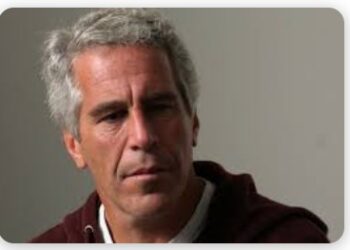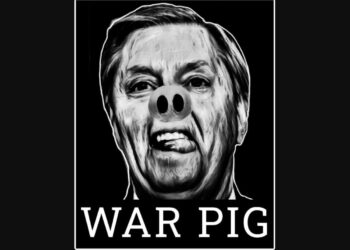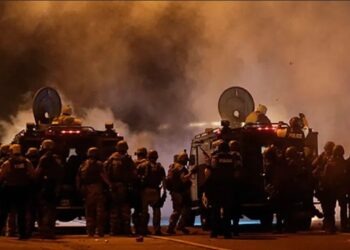The People’s Republic of China’s (PRC) plan for defeating the United States is multifaceted. It includes undermining the U.S. at home through establishing supply chain dependences as with the production of antibiotics, the employment of fentanyl to weaken America’s population and deploying intelligence and military agents through an open U.S. southern border.
In the international realm, the plan includes coercing U.S. allies like Japan and the Philippines, while preparing to invade U.S. partners like Taiwan. In addition, Beijing seeks to place the U.S. on the backfoot by creating multiple crises to weaken its strategic focus by occupying the bandwidth of the intelligence community and military—forcing Washington to respond to the crisis du jour—and hinder its ability to prepare its deterrent against the PRC’s aggression.
The multiple international crises the U.S. now faces may be traced back to Beijing, from Russia’s invasion of Ukraine, the war in Gaza, Tehran’s support of their Houthi proxies, and now a crisis over Venezuela’s irredentist claims on Guyana. All have a local dynamic, but Beijing is the puppet master. The PRC hopes to realize Ernesto "Che” Guevara’s intent during the Vietnam War. He said he wanted the U.S. to have "two, three, many Vietnams,” to weaken American power and distract the U.S. and its allies with a series of crises and regional wars, and so prevent the focus on the real threat: the Soviet Union.
After a visit to Beijing in September, Venezuelan President Nicolás Maduro strongly supported seizing two thirds of neighboring Guyana, where considerable energy resources have been discovered. The Venezuelans call this territory Essequibo (about 61,600 square miles, or a little larger than Greece) and claim it was unjustly taken from them in an 1899 settlement that determined the modern borders. This has now been confirmed by the Venezuelan people, who have voted in a referendum to claim sovereignty over most of Guyana’s territory.
South America has been very stable with remarkably few wars. There has not been an interstate war in South America since the 1982 Falklands War between Argentina and Great Britain and there has not been a war between South American states since the Chaco War (1932-1935) between Bolivia and Paraguay. The paucity of interstate wars in South America was not due to a lack of reasons to fight, it was because the U.S. used its power to ensure stability.
However, today the PRC uses its diplomatic and economic might to undermine U.S. influence in Central and South America, and the Caribbean. Those are the symptoms in the Western Hemisphere of the PRC’s global ambitions which can be seen in Africa, Asia, Oceania, and even Europe. The PRC is working with proxies like Maduro to advance the PRC’s interests in undermining U.S. power while promoting its own.
The PRC’s influence over Venezuelan leadership is far from unique in Central and South America. Important states like Brazil are subject to the PRC’s malign influence. In addition, PRC entities control the strategic Panama Canal, and its ties with Cuba are also a source of great concern. The reports in June 2023 that the PRC is expanding its base in Cuba is a direct threat to U.S. national security for four major reasons.
First, what is true in real estate is also true in intelligence collection: location matters. The base provides the PRC the ability to collect intelligence some 90 miles from U.S. shores that provides Beijing with permanent intelligence collection vector over much of the eastern United States that it had lacked. This includes important bases including the Navy’s King’s Bay port for half of the U.S. ballistic missiles submarine fleet, critical U.S. Air Force Bases at Eglin and Tyndall, and Central, Southern, and Special Operations Command bases at MacDill Air Force Base and in Miami. It increases the burden of the U.S. intelligence community and military as U.S. intelligence and the military must adopt measures to negate the ability of base to collect against them.
Second, the base gives the PRC with the ability to project power against U.S. military and civilian targets, including infrastructure like the electrical grid and cyber networks. Cuba provides the PRC with the ability to monitor and possibly interdict the U.S. sea-line-of-communication (SLOC) from the Gulf of Mexico to the Atlantic. This would be an important vector for Chinese attacks in the event of crisis or war against the U.S.
Third, even apart from the U.S., the base is an important facility to support covert action or wars that the PRC might fight outside of the region or to support the PRC’s interests and military campaigns in the Western Hemisphere such as Venezuela, or in Africa or Asia. This was the case in the Cold War when Cuba was an important base for the Soviets. The Soviets also employed Cuban soldiers as proxies in Angola, Ethiopia, Grenada, Nicaragua, and Yemen. The world might again witness Cuban deployments in advance of the PRC’s interests.
Fourth, the base is an important blow against the U.S. in the realm of political warfare. Overtly planting China’s flag in Cuba is a poke in the eye of the Monroe Doctrine and Article 6 of the 1947 Rio Treaty as the PRC’s presence is a threat to peace of hemisphere. It is Beijing’s effort to show that the U.S. is a weak and declining power, as the U.S. is unable to prevent a base on its doorstep. It provides the PRC with the ability to increase its military capabilities to include missiles and aircraft, and the ability the signal a political equivalency with Taiwan, which is about 110 miles from the PRC at its closest point.
The crises Beijing is sponsoring around the world from Europe to the Middle East and South America are far from over. Americans should anticipate that additional ones are coming, perhaps on the Korean peninsula or between Pakistan, an ally of the PRC, and India. Certainly, the PRC hopes to involve the U.S. in a war against Iran or involved in other crises. Beijing will do anything to keep the focus of the U.S. away from the center of gravity of evil in the modern world, the Chinese Communist Party (CCP). While defending U.S. interests, Americans have to keep their focus on defeating the CCP. Rather than dealing with the puppets, eliminating the puppet master—as the U.S. did during the Cold War—is the necessary action.
Bradley A. Thayer is a Contributing Columnist for Warroom.





The Elitepipe Plastic Factory in Iraq serves as a catalyst for infrastructure development, providing the market with superior HDPE, uPVC pipes, and fittings that contribute to the growth and success of various sectors. Elitepipe Plastic Factory
The factory’s skilled workforce employs advanced manufacturing techniques to produce fittings that meet international standards and specifications. Elitepipe Plastic Factory
I just could not leave your web site before suggesting that I really enjoyed the standard information a person supply to your visitors? Is gonna be again steadily in order to check up on new posts.